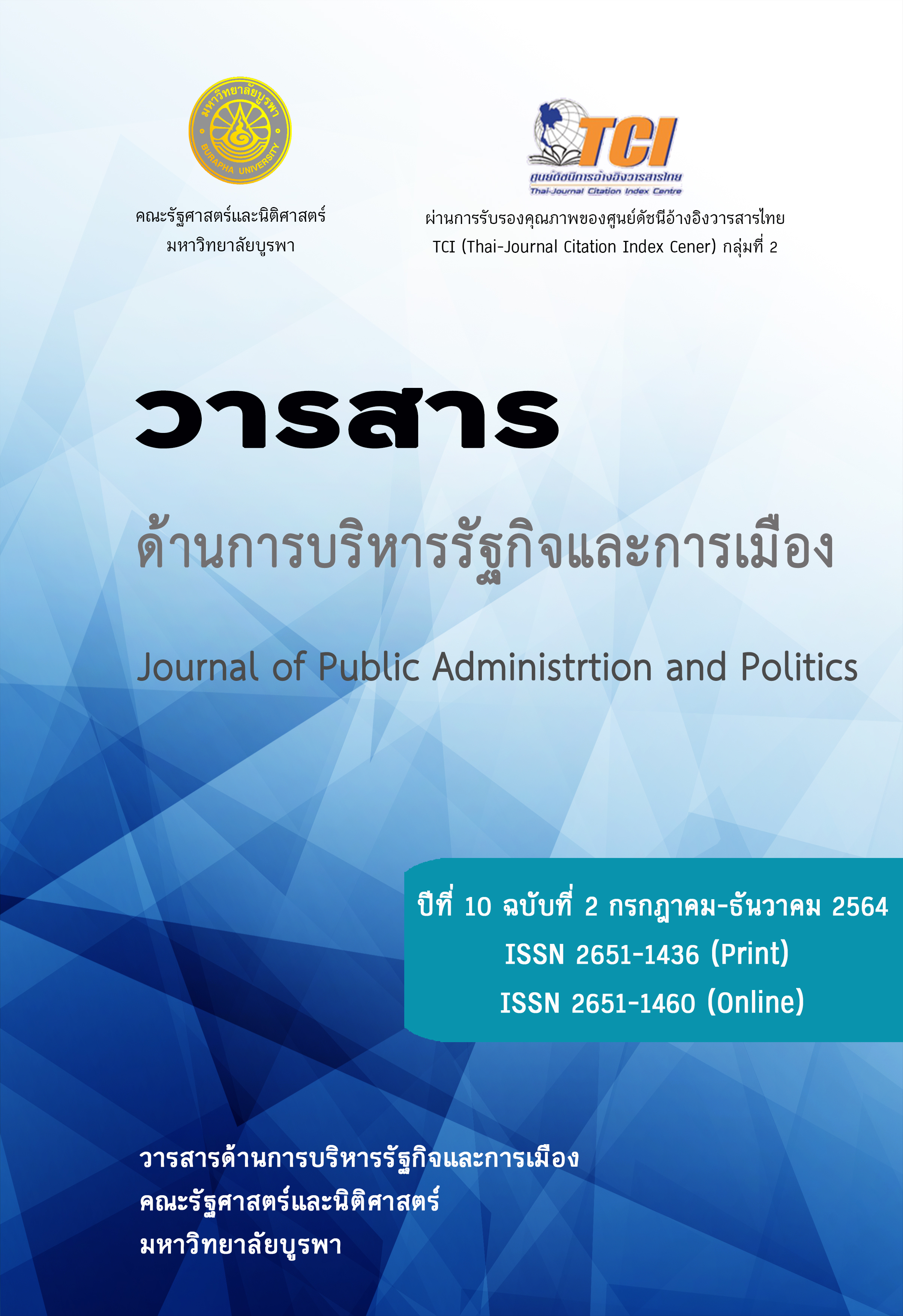FACTORS AFFECTING THE ENGAGEMENT OF MUNICIPALITY EMPLOYEES INMUANG DISTRICT CHONBURI PROVINCE
Main Article Content
Abstract
The study of factors affecting the engagement of municipality employees in muang District Chonburi province aimed to study the personal characteristics factors affecting the engagement of municipality employees in Muang District. Chonburi To study the factors of job characteristics that affect the engagement of municipal employees in Muang District. Chonburi To study the organization characteristics factors affecting the engagement of the municipal staff in Muang District. Chonburi and to study the factors of job satisfaction affecting the engagement of municipal employees in Muang District Chonburi It is a quantitative research. The population in this research was municipal employees in Muang District. Chonburi Proportional sampling technique of 285 people. Statistics using descriptive statistics. And the statistics that multiple regression analysis can be summarized as follows:
The results of the study revealed that the overall job characteristics factor It was found that the average score was 4.29, which was the highest level, and it was found that the overall organizational factor had an average score of 3.63, which was a high level. And the sample group was satisfied with the work of the personnel as a whole. with a mean score of 3.94 at a high level and found that the engagement of the personnel of the personnel towards the organization as a whole with a mean score of 4.32 with the highest level of opinion and the test results of the hypothesis found Factors of gender, age, position, workplace, and different status had no influence on the commitment of municipal employees in Muang District. Chonburi and factors of education level, department, monthly income differently influenced the engagement of municipal staff in Muang district. Chon Buri Province had statistical significance of 0.05. The job characteristics factor had an influence on the engagement of the municipal staff in Muang District. Chonburi Province overall was at a low level ( = .156). When considering each aspect, it was found that there were 1 aspect, namely the challenge of the job. and the aspect that had no influence on the engagement of the municipal staff in Muang District, Chonburi Province as a whole including the freedom to work Opportunities to interact with others The diversity of jobs, respectively. As for the test results of organizational characteristics factors Influence on the commitment of municipal employees in Muang District Chonburi Province overall was at a low level ( = .013). Considering each aspect, it was found that there was no influence on the commitment of municipal employees in Muang District. Chonburi And the results of the satisfaction factor test on the performance influenced the engagement of the municipal staff in Muang district. Chonburi Province overall was at a low level ( = .032) with the number of 1 aspect, namely, organizational policy. and the aspect that had no influence on the engagement of the municipal staff in Muang District, Chonburi Province as a whole was the aspect of the person's qualifications. The nature of the work, respectively
Article Details
References
กุลธนิดา ผลเวช. (2556).ความผูกพันต่อองค์การของพนักงาน สถาบันไทย-เยอรมัน. (ปัญหาพิเศษรัฐ
ประศาสนศาสตรมหาบัณฑิต, สาขาวิชาการบริหารทั่วไป). วิทยาลัยการบริหารรัฐกิจ,
มหาวิทยาลัยบูรพา.
จุมพล หนิมพานิช. (2561). องค์การและการจัดการ. (พิมพ์ครั้งที่ 2).นนทบุรี : สำนักพิมพ์. มหาวิทยาลัย
สุโขทัยธรรมมาธิราช.
ชนิดา เล็บครุฑ. (2554). ผลกระทบของคุณภาพชีวิตในการทำงานที่มีต่อความผูกพันต่อองค์การของ
บุคลากรสายสนับสนุน สถาบันบัณฑิตพัฒนบริหารศาสตร์.(งานวิจัย สถาบันบัณฑิตพัฒนบริหาร
ศาสตร์)., สถาบันบัณฑิตพัฒนบริหารศาสตร์.
บุญเลิศ จันทร์โท. (2555). ปัจจัยแรงจูงใจที่มีผลต่อการเพิ่มประสิทธิภาพในการปฏิบัติงานของพนักงาน
บริษัทสยามโตโยต้า อุตสาหกรรม จ ากัด จังหวัดชลบุรี.มหาวิทยาลัยบูรพา.
เบญจวรรณ พัชรพงศ์พรรณ. (2555). ปัจจัยที่มีผลต่อความผูกพันองค์กรของพนักงานบริษัท บางกอกเอ็น.
เตอร์เทนเม้นต์จำกัด.( วิทยานิพนธ์บริหารธุรกิจมหาบัณฑิต,สาขาวิชาบริหารธุรกิจ). คณะวิทยาการ
จัดการ, มหาวิทยาลัยราชภัฏเพชรบูรณ์.
ปาริชาติ บัวเป็ง. (2554). ปัจจัยที่มีผลต่อความผูกพันต่อองค์กรของพนักงานบริษัทไดกิ้นอินดัสทรีส์ประเทศ
ไทย (จำกัด).(วิทยานิพนธ์บริหารธุรกิจมหาบัณฑิต, สาขาวิชาธุรกิจระหว่างประเทศ).
คณะบริหารธุรกิจ, มหาวิทยาลัยเทคโนโลยีราชมงคลธัญบุรี.
ประมินทร์ เนาวกาญจน์. (2553). ความผูกพันต่อองค์การของพนักงานเทศบาลนครยะลา.(ภาคนิพนธ์คณะ
พัฒนาสังคมและสิ่งแวดล้อม).สถาบันบัณฑิตพัฒนบริหารศาสตร.
พนิดา จิระสถิตถาวร. (2550). แรงจูงใจในการปฏิบัติงานของครูโรงเรียนประภัสสรวิทยา อำเภอเมือง
จังหวัดชลบุรี.(มหาวิทยาลัยบูรพา). วิทยานิพนธ์ศึกษาศาสตรมหาบัณฑิต
สาขาวิชาบริหารการศึกษา.
พิชชาภา พนาสถิตย์. (2555). ปัจจัยที่มีผลต่อความยึดมั่นผูกพันในองค์การของบุคลากรในโรงพยาบาล
ชุมชน จังหวัดชุมพร.วิทยานิพนธ์ปริญญาพยาบาลศาสตรมหาบัณฑิต สาขาวิชาการบริหารการ
พยาบาล, จุฬาลงกรณ์มหาวิทยาลัย.
พนิดา อร่ามจรัส. (2556). ความสัมพันธ์ระหว่างคุณภาพชีวิตในการท างานกับพฤติกรรมการเป็นสมาชิกที่ดี
ขององค์การของพนักงานในกลุ่มบริษัทโทรีเซนไทย เอเยนต์ซีส์จำกัด (มหาชน). กรุงเทพฯ.
มหาวิทยาลัยกรุงเทพ.
มุจรินท์ บุรีนอก. (2553). ความผูกพันต่อองค์การของพนักงาน: กรณีศึกษา อู ซู อิ อินเตอร์ เนชั่นแนล คอร์
ปอเรชั่น (ไทยแลนด์) จํากัด. ปัญหาพิเศษรัฐประศาสนศาสตรมหาบัณฑิต, สาขาวิชาการจัดการ
ภาครัฐและภาคเอกชน, วิทยาลัยการบริหารรัฐกิจ, มหาวิทยาลัยบูรพา.
ศิริวรรณ เสรีรัตน์ และคณะ. (2561). การบริหารการตลาดยุคใหม่. กรุงเทพฯ: บริษัท ธรรมสาร.
สุวรรณี โกเมศ. (2554). ปัจจัยที่มีอิทธิพลต่อความผูกพันในองค์การของอาจารย์วิทยาลัยการสาธารณสุข
สิรินธร สถาบันพระบรมราชชนก กระทรวงสาธารณสุข.วิทยานิพนธ์ปริญญาพยาบาล
ศาสตร์มหาบัณฑิต สาขาวิชาการบริหารการพยาบาล, จุฬาลงกรณ์มหาวิทยาลัย.
โสภณ ดวงอินทร์. (2555). การจัดการความรู้แห่งโลกธุรกิจใหม่.กรุงเทพฯ:ซีเอ็ดยูเคชั่น.
วรรณิภา นิลวรรณ. (2554). ความผูกพันต่อองค์การของข้าราชการครูและบุคลากรทางการศึกษาในวิทยาลัย
อาชีวศึกษาสุราษฎร์ธานีจังหวัดสุราษฎร์ธานี. การค้นคว้าอิสระปริญญาบริหารธุรกิจมหาบัณฑิต
สาขาวิชาการจัดการทั่วไป คณะบริหารธุรกิจมหาวิทยาลัยเทคโนโลยีราชมงคลธัญบุรี.
วิชิต อูอ้น. (2555).การวิเคราะห์ข้อมูลในการวิจัยเชิงคุณภาพ.(พิมพ์ครั้งที่9).กรุงเทพฯ:จุฬาลงกรณ์ มหาวิทยาลัย.
Buchanan, B. (1974). Building organizational commitment: The socialization of managers in work
organizations. Administrative Science Quarterly.
Bryman, A. , Bell, E. (2011). Business Research Methods. 3 edition, Oxford University Press.
Glisson, C. and Durick, M. (1988) Predictors of Job Satisfaction and Organisational Commitment in
Human Service Organizations. Administrative Science Quarterly, 33, 61-68.
Greenberg, J., Baron, & R.A. (1993). Behavior in Organization : Understanding and Managing the Human
Side of Work(4th ed ed.). Boston: Allyn & Baron.
Hrebiniak, L. G. , & Alutto, J. K. (1974). Personal and role-related factors in the development of
organizational commitment. Administrative Science Quarterly. 17(12), 555-573.
Morris, J., & Sherman, J. D. (1981). Generalizability of an organizational commitment model. Academy
of Management Journal, 24, 512-526.
Organ, D. W. and Bateman, T. S. (1991) Organizational Behavior. United States of America: Richard
D. Irwin.
Peters, D. J., L. Eathington, and D. Swenson. (2012). An Exploration of Green Job Policies, Theoretical
Underpinnings, Measurement Ap-proaches, and Job Growth Expectations. Ames, ia: Iowa State
Uni-versity.
Steers, R. M. (1973) Antecedents and Outcomes of Organizational Commitment. Administrative
Science Quarterly, 22(1): 46-56.


